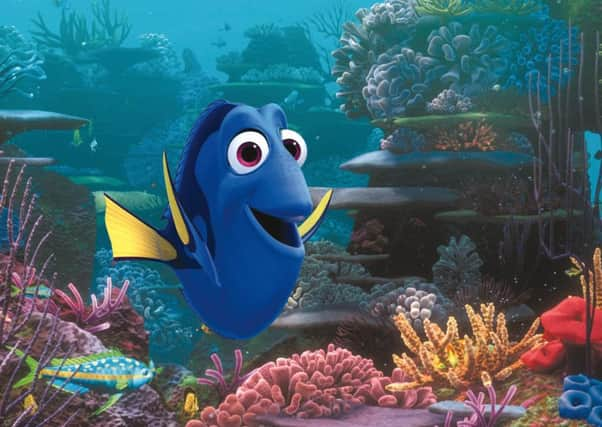Film reviews: Finding Dory | Hunt for the Wilderpeople


It also helped set the emotional tone for which Pixar is revered. In an infantilised culture where children have to be shielded from anything that might upset them, it’s the tale of an anxious clown fish trying to rescue his adventurous, flipper-deformed son from a dentist surgery fish tank, which tapped into the anxieties of over-protective parents the world over.
Although any trauma was pretty mild – we’re not talking Bambi’s mother getting shot – the film celebrated the value of taking a few risks in life, albeit within certain boundaries. That pretty much sums up the sequel.
Advertisement
Hide AdFinding Dory (***) – which has its British premiere at the Edinburgh International Film Festival today – lacks the emotional depth of the Toy Story films and the conceptual daring of last year’s magnificent Inside Out. Yet within the safe framework of a follow-up movie with plenty of brand recognition and warm-hearted sensibilities, it does make a very welcome, and quite subtle, case for diversity by celebrating its characters’ perceived disabilities as strengths. That theme emerges from the film’s decision to focus on the forgetful blue tang fish that served as scene-stealing support first time round.
Voiced once again by Ellen DeGeneres, Dory and her short-term memory problems could have been a great way for directors Andrew Stanton and Angus MacLane to push the narrative boundaries with an inventively structured plot. Instead they set the action a year on from the first film and use conventional flashbacks to fill us in on how Dory came to be separated from her own family.
Nevertheless, in doing so they also generate plenty of empathy for Dory’s plight as brief moments of lucidity within her generally confused state send her on an impulsive and intuitive journey that takes her to the Marine Park Institute where long-lost friends – among them a short-sighted shark and a grouchy octopus with only seven tentacles – nudge her towards an understanding of where she came from. There are some amusing gags along the way, some typically elaborate action sequences and some inspired voice cameos (none better than The Wire’s Dominic West and Idris Elba playing a couple of boisterous sea lions) – and yet as likeable and fun as all this is, Finding Dory, somewhat ironically, fades from memory pretty quickly.
Much better is Hunt for the Wilderpeople (****), which has another screening at the festival next week. It’s the latest wry comedy from What We Do in the Shadows director Taika Waititi and, like his wonderful break-out film Boy – the most successful New Zealand film of all time (it debuted at EIFF in 2010) – it’s another sweet but unsentimental family-themed comedy, this time revolving around a troubled, overweight foster kid called Ricky Baker (Julian Dennison) who goes on the run in the bush to avoid being sent to a juvenile detention centre after his new foster mum passes away suddenly.
Teaming up with her curmudgeonly husband, Hec (Sam Neill), the mismatched duo are pursued through the wilderness by an obsessive social worker (Rachel House) whose unofficial “no child left behind” mantra has blinded her to what’s best for the kids she’s supposedly trying to help. Waititi keeps the jokes coming thick and fast as the nationwide manhunt sparked by Ricky’s disappearance with Hec – a former convict – brings them into contact with hunters, cops, wild hogs and, at one, point, the girl of Ricky’s dreams.
Making good use of its wilderness locations, it’s the sort of film that understands how to deliver hi-jinks and heightened characters, but also emotions that really resonate. It’s funny because of how much you care about the central characters.
Advertisement
Hide AdIn this, Waititi has lucked out with Dennison, a naturally gifted comedian whose relative inexperience – it’s only his third film – never shows as he goes toe-to-toe with Neill, holding his own as they trade affectionate barbs that mask the pain both characters feel deep down.
And Neill’s a bit of a revelation here too. Rarely called upon for comedy, he’s a deadpan delight as the Crocodile Dundee-like Hec, contrasting brilliantly with the wannabe streetwise Ricky (he names his dog Tu Pac) and making some of the tonally risqué humour regarding their relationship even funnier.
Advertisement
Hide AdAs for Waititi (who has a cameo in the film as a minister with a weird line in religious metaphors), he’s been lured to Marvel to direct the next Thor movie. Hopefully that’s a sign that the mainstream is now ready for his sensibilities.
Along with Flight of the Conchords, with whom he’s been closely associated since the start of his career (he and Jemaine Clement used to perform together), he’s helped put New Zealand comedy on the map – proof that a small country can punch far above its weight. If only the same was true here.